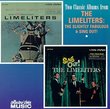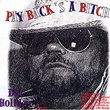| All Artists: Franz Liszt, Joseph Banowetz Title: Franz Liszt: Complete Song Transcriptions of Chopin, Mendelssohn, Robert and Clara Schumann Members Wishing: 0 Total Copies: 0 Label: Naxos Release Date: 12/1/1997 Genre: Classical Style: Number of Discs: 1 SwapaCD Credits: 1 UPC: 730099465625 |
Search - Franz Liszt, Joseph Banowetz :: Franz Liszt: Complete Song Transcriptions of Chopin, Mendelssohn, Robert and Clara Schumann
 | Franz Liszt, Joseph Banowetz Franz Liszt: Complete Song Transcriptions of Chopin, Mendelssohn, Robert and Clara Schumann Genre: Classical
|
Larger Image |
CD DetailsSimilar CDs
|
CD ReviewsLiszt - Endorses the Good, the Bad, and the Boring Hexameron | 06/30/2006 (3 out of 5 stars) "Volume 6 of Naxos' Complete Piano Music of Liszt continues the exploration of Liszt's transcriptions of lieder begun in the previous Volume 5. Compared to the commercial greats of pianism, Joseph Banowetz is not well known, and yet I think he is one of the most versatile pianists alive. His repertory is variegated and often incongruent: he has left many recordings of Bach, Anton Rubinstein, Balakirev and Ronald Stevenson. I am an ardent supporter of Banowetz because of his amazing recordings of Anton's Rubinstein's works on the Marco Polo label. My three star rating, which to Amazon indicates a merely "okay" and "decent" opinion, is mostly due to the pieces themselves... and perhaps my taste.
Although never thanked for his benevolence, Liszt transcribed songs from a slew of composers, some famous and some forgotten. Liszt's transcriptions of Chopin, the Schumanns, and Mendelssohn are lovely contributions. On the surface, most of these songs are pretty and agreeable. Chopin's are ingenious, though. His Chants Polonais Op. 74 are barely known but they are just as glorious as his solo piano works. Liszt's pianistic understanding and merger of Chopin's vocal line and accompaniment showcase true craftsmanship. Listening to "Zyczenie" (The Maiden's Wish) always puts me in a good mood. "Moja pieszczotka" (My Joys) is a sweetly nostalgic piece that would have been just as popular as his nocturnes if it had originally been a solo piano work. The same could also be said for the turbulent and exciting "Narzeczony" (Homeward) that with Liszt's reworking becomes a virtuosic mini-drama comparable to Chopin's own "Revolutionary" etude. Banowetz is in full command of the piano here. His dynamics and interpretations are worthy of praise and he understands Chopin's language like the best of them. I found myself less enamored with these selections of miniatures by Clara and Robert Schumann. I don't question the artistic or compositional weight of them, but I feel that some are too lackluster. After repeatedly listening to the Clara Schumann transcriptions, I fail to find them different or even interesting. In my opinion, they're pretty and nothing more. I don't mean to disparage Clara because she definitely had a compositional voice. I very much like her piano concerto, piano sonata and piano trio, but these three lieder leave me cold. Banowetz's patient and tender phrasing is admirable but it can't save the banality of these songs. Robert Schumann's songs fair a little better, but not that much. "Des Sennen Abschied" (The Cowherd's Farewell) is of the same gentleness as Clara's but manages to convey more melodic and harmonic substance. "Nur wer die Sehnsucht" (None but the lonely heart) is a marvelous tapestry of Schumann's romantic idiom that expresses heartbreak and love. Of these 12 Schumann songs, none is perhaps more famous than "Liebeslied Widmung." Liszt transcribed Schumann's song into two versions: a faithful rendition and a concert arrangement. Schumann's music resonates through both, but Liszt manages to spice up the ornamentation in his concert version. The other songs that I did not mention just failed to impress me and I would call them Schumann's mediocrities. Needless to say, and despite the lackluster quality, Banowetz gives a sensational performance in each transcription. Some of the Schumann songs are less memorable than others, but at least Mendelssohn achieves some incredible moments. Though "Winterlied" barely gets going before it ends, an unfortunate haphazard in the composition of miniatures, "Suleika" and "Wasserfahrt" are significant essays with real expressive content. "Wasserfahrt" (Boating Trip) is haunting and mesmerizing. "Der Jäger Abschied" (Hunter's Farewell) for all its 4.5 minutes has a few lovely ideas but little more than charm to recommend itself. "Neue Liebe" and "Fruhlingslied" exhibit more drama, especially through Liszt's pianistic artistry and they can be emotionally stirring. I must confess, though, that I am naturally critical of miniatures. I feel that they have to express so much in so little time in order to be successful. Many miniatures do not, and some of these Mendelssohn songs do not encourage repeated hearings, at least for me. Bottom line: There *are* some gems hidden all over this CD. Chopin's and Mendelssohn's are predominantly outstanding, while the Schumanns' are disappointing. For those who have relished their Schubert-Liszt, I'm afraid this recording is not of the same caliber. Liszt's selfless promotion of his contemporaries will always be viewed in a positive light. His choice of songs for transcription, however, is peculiar. I don't advise against buying this recording, especially at the budget Naxos price, but would suggest keeping expectations at a minimum." |

 Track Listings (30) - Disc #1
Track Listings (30) - Disc #1


